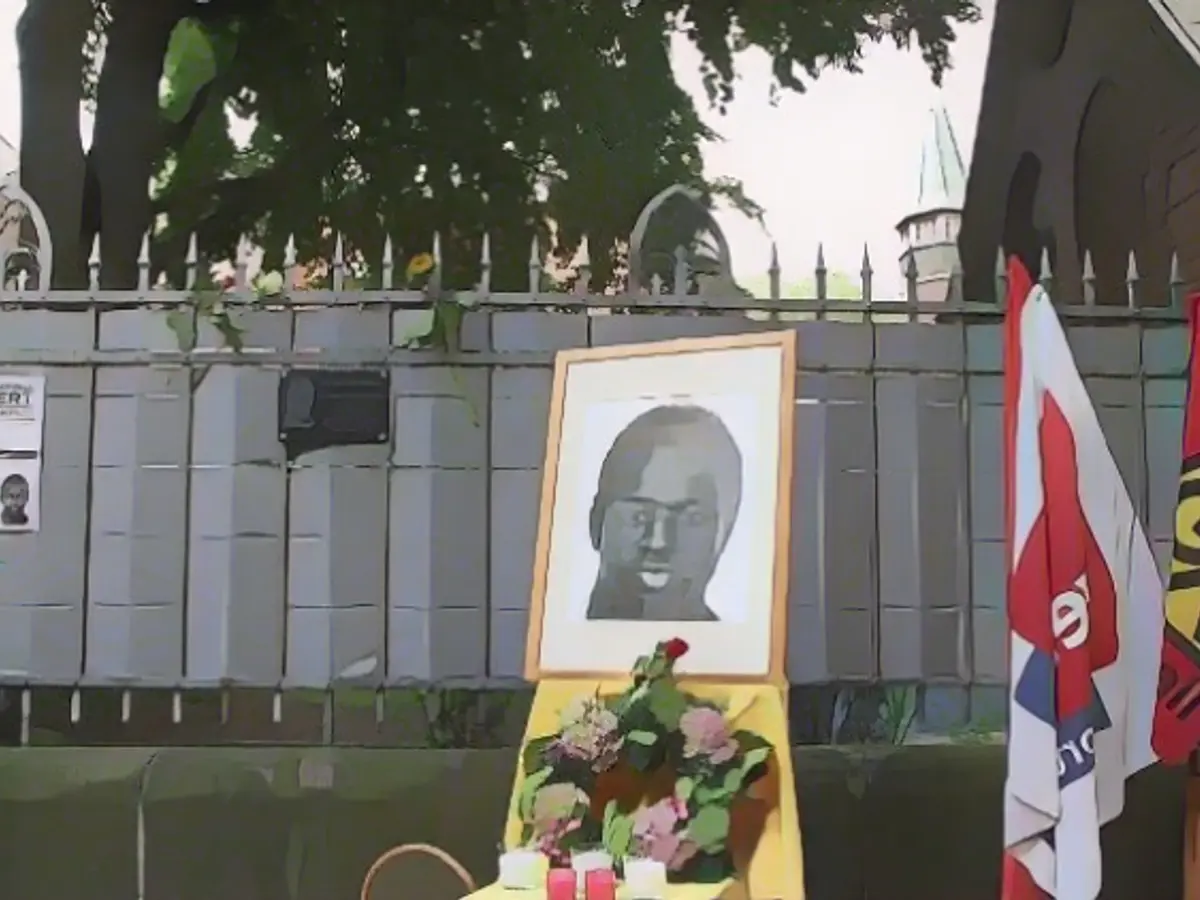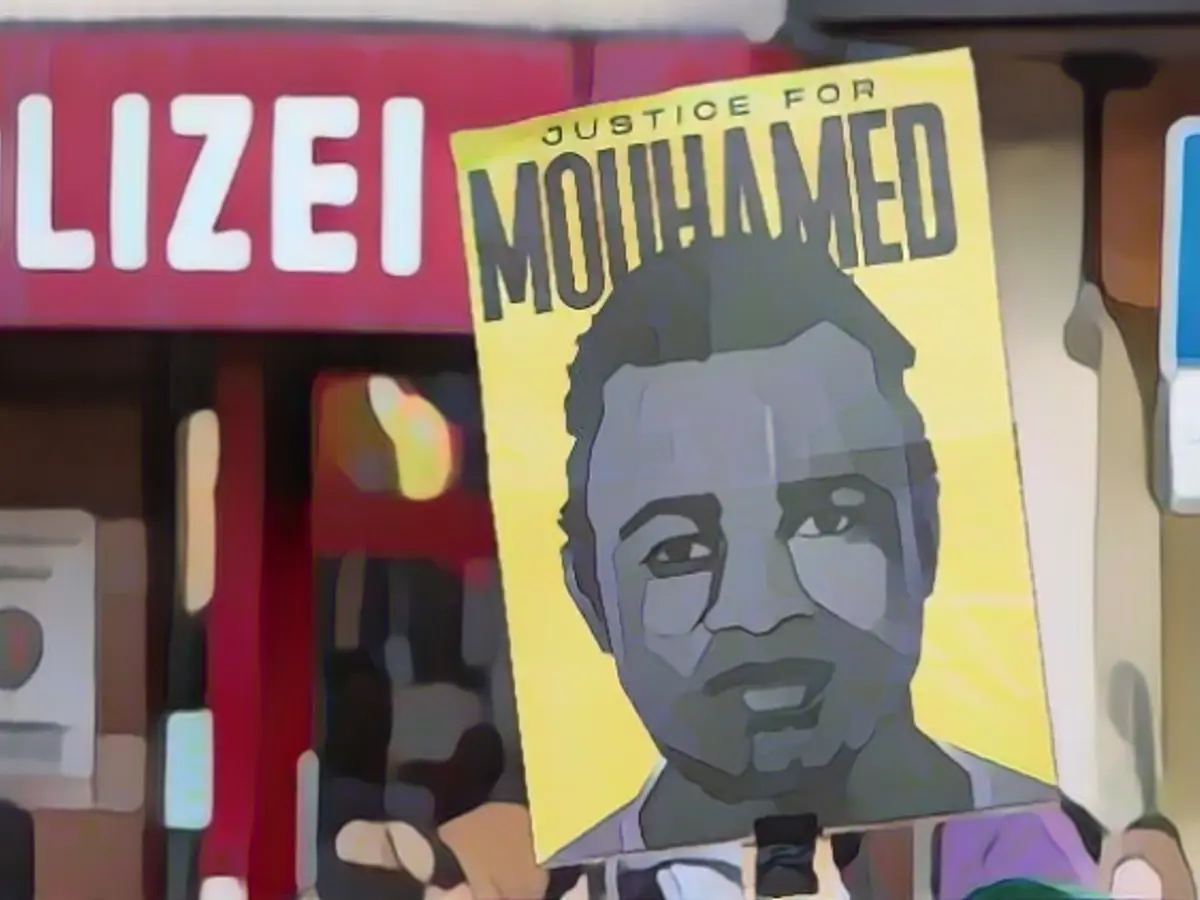"Why is a 16-year-old boy being shot?"
On August 8, 2022, 16-year-old Mouhamed Dramé was killed by five bullets from a police submachine gun in Dortmund's Nordstadt district. Five police officers now have to answer for the fatal attack at Dortmund District Court. It is a trial that tells us a lot about the country.
Mouhamed Dramé had only been in Dortmund for a week after a long escape from Senegal. Then he was hit by five bullets from a police submachine gun. He died. Shortly beforehand, a caregiver from a residential group had called the police for help. The 16-year-old was said to be acutely suicidal and was holding a knife to his stomach. A total of twelve police officers attended the scene. The hoped-for de-escalation turned into a tragedy. One that causes nationwide outrage. One that triggers a debate about the proportionality of police operations. But especially one that took the life of a 16-year-old teenager, an enthusiastic footballer in the home town of his favorite club Borussia Dortmund.
From today, Tuesday, three policemen and two policewomen will have to answer for the events of August 8, 2022 in Missundestraße in Dortmund at Dortmund Regional Court. 30-year-old Fabian S. is charged with manslaughter. 31-year-old Jeannine Denise B., 29-year-old Pia Katharina B. and 34-year-old Markus B. have to answer for causing grievous bodily harm in the line of duty through the unjustified use of pepper spray and tasers. The 55-year-old squad leader Thorsten H. is accused of inciting dangerous bodily harm in office.

According to the investigation, the accused 34-year-old allegedly sprayed the squatting Mouhamed with pepper spray on the orders of the squad leader. The teenager then allegedly jumped up and moved towards the police officers with the knife. As previously agreed, the two other defendants then allegedly inflicted electric shocks on him from a distance using a Taser, shortly before the shots were fired. Mouhamed then died. Eleven trial days are scheduled until mid-April 2024 before a verdict is reached.
In which direction are the police moving?
"It's a trial that has very high social and political expectations," says Michael Mertens, the NRW state chairman of the police union (GdP), in an interview with ntv.de: "The trial will be a burden for everyone - for the relatives, but also for the police forces. Everyone will have to relive this August 8, 2022."
Beneath the terrible events, situation by situation, a scene is emerging that seems likely to influence numerous debates in Germany. It is about the training and the path of the German police, which, as police scientist Rafael Behr puts it, is moving away from the idea of a citizen police force and towards a law-and-order police force. It is about the resulting loss of trust among citizens. However, it is also about the question of how a society provides justice to those who have no voice and how it welcomes these people into the country in the first place.
Mouhamed's family is still shaken well over a year after the events. Around a month before the start of the trial, Sidy and Lamine Dramé visited the place that took their brother and son for the first time. They had traveled all the way from Senegal to the Ruhr region. "We in Africa see this as racism on the part of the German police officers. What they did is unacceptable," Sidy, the brother of the man killed, told WDR. "The way Mouhamed was killed can be a lesson for everyone." The Dramés are confronting the police with massive accusations, and they are accusations that will also play a role in the trial in Dortmund. Before the trial begins, the Justice4Mouhamed solidarity group will hold a vigil in front of the district court. This group also accuses the police of "racist stereotypes".
"Police must decide facts in fractions of a second"
A whole world is being negotiated on the back of the man who was killed. Lawyer Lisa Grüter is representing the family. She is the lawyer for the joint plaintiff. In an interview with ntv.de, she says: "The family is concerned with clarification. They are shocked that Mouhamed survived the arduous escape only to be shot dead by the police. They want justice."
This will be achieved by clarifying the question of whether the use of the submachine gun was justified. This is carried in the police car, but must be removed from a secure compartment. Justice will also be done on the question of whether the pepper spray and Taser should have been used at all. The brutality that led to the death of 16-year-old Mouhamed Dramé shocked far beyond Dortmund's city limits. How could the operation escalate to such an extent?
The proportionality of the operation must be clarified at the Dortmund district court: do you really need twelve police officers and potentially lethal weapons to calm down a 16-year-old with suicidal intentions? "Police officers always live in situations that have to be decided in fractions of a second. Will pepper spray be used, a Taser or, as in Dortmund, a firearm? Unlike the legal process, there is no time," says Mertens, who is also the deputy federal chairman of the GdP: "Decisions have to be made now. This is our daily bread. We have to decide what will be used."
The question of the mildest means
This is another reason why 55-year-old service group leader Thorsten H. is in the dock. He was the decision-maker that day. In any case, what is now being negotiated is a rarity. Only two percent of cases ever go to court. Tobias Singelnstein told ntv.de two years ago that the normal prosecution rate is 20 to 25 percent. Criminologist Singelnstein is one of the authors of a study that deals with unlawful police violence.
The charges against Thorsten H. were "not surprising after the public pressure", his lawyer Michael Emde told WDR in late November. Nevertheless, the charge is "questionable" because his client is of the opinion that he "chose the mildest possible means" in the operation. Even if this mildest means, probably meaning the use of the triad of pepper spray, Taser and machine gun, would have had a "terrible" result.
A terrible, but not so rare result: between 2012 and 2022, according to statistics from the German Police University, the police shot 116 people - almost always emergency assistance and self-defense, in individual cases also the prevention of crime, were given as the reason for the fatal use of firearms by police officers.
What the use of firearms by the police has changed
The use of pepper spray in particular is now almost part of the standard police repertoire. Mostly in soccer stadiums or at demonstrations. "Pepper spray and Tasers do not de-escalate, they are escalating agents that inflict pain," police scientist Behr told dpa. "The police act as if every incident in which someone has a knife is a matter of life and death. We have to get away from this way of thinking." Behr called for better education and training for police forces.
"The operation has triggered a major debate in the police force about how to deal with mentally ill people," says Mertens, the trade unionist. One consequence of Dortmund: there are now two more training days for police officers. The additional training sessions are mainly intended to provide further training in dealing with mental disorders and to raise awareness of foreign cultural backgrounds.
Weeks after the operation, the senior public prosecutor Carsten Dombert did not recognize a self-defence situation and therefore no justification for what happened. He criticized the choice of means. By shooting Mouhamed in the torso and head, the police officer had accepted Mouhamed's death. Dirk Heidemann felt the same way. From October 2012 to March 2022, he was head of Department I.1 "Leadership in the Police" at the German Police University. After the incidents in Dortmund, he wrote in a blog about his horror at the death of 16-year-old Mouhamed, a "person in need of protection in all respects - due to his age, his history of flight and undoubtedly also due to his current mental state", which cannot be put into words.
What needs to be clarified in Dortmund
The case also sheds light on the situation of unaccompanied minors and young adults in Germany and on those whose job it is to accompany these people on their arrival. As of December 12, 2023, a total of 39,964 were living under the responsibility of child and youth welfare services, a far cry from the peak of 69,004 in February 2016, but a slight increase since October 2022, when the number was just over 25,000. The reasons for fleeing are war and civil war, physical violence, a lack of prospects in their home country, a precarious economic situation or persecution due to ethnic, national or religious affiliation.
In most cases, fleeing to Germany is not only arduous and full of suffering - it always is - but in many cases exacerbates the psychological damage suffered at home. Current figures in the Psychosocial Care Report 2023 show that nine out of ten refugees in Germany have suffered traumatic experiences and around 30 percent suffer from trauma-related disorders.
Psychosocial and psychotherapeutic care in Germany continues to be rated as inadequate by the key players, the federal states and professional associations. Financial resources are being cut and bureaucratic hurdles are increasing. If there is no support from psychosocial counseling, this makes arrival and integration into everyday life more difficult. If there is no support, society incurs higher costs and possibly other problems.
Mouhamed Dramé had only been in Dortmund for a few days when he sought help, underwent psychiatric treatment and left the facility the day before he died. "When the police were called on that August 8, 2022, all the other experts had already been dealing with it for a long time. Especially in the last 48 hours before the event. These experts called the police," says police union member Mertens. What happened after this call will now have to be clarified. "The family is asking themselves: why is a 16-year-old boy being shot dead by the police in Germany?" says lawyer Grüter.
Read also:
- Snow chaos further restricts Bavaria
- Unanimous decision: faster wolf culls possible
- The year of climate records: extreme is the new normal
- Snow and ice paralyze southern Germany
- The trial regarding the police encounter with Mouhamed Dramé in Dortmund's Nordstadt district is attracting international attention, as it raises questions about the country's refugee policy and police violence.
- The case of Mouhamed Dramé, a 16-year-old refugee from Senegal, has sparked a debate about the role of police forces in dealing with refugees and mental health issues.
- The Dortmund Police Union has expressed concern about the impact of the trial on both the police officers involved and the entire force, as the events of August 8, 2022, continue to resonate nationally and internationally.
- The Justice4Mouhamed solidarity group, which is advocating for Mouhamed's family, has accused the police of using "racist stereotypes" and has planned a vigil in front of the district court during the trial.
Source: www.ntv.de






